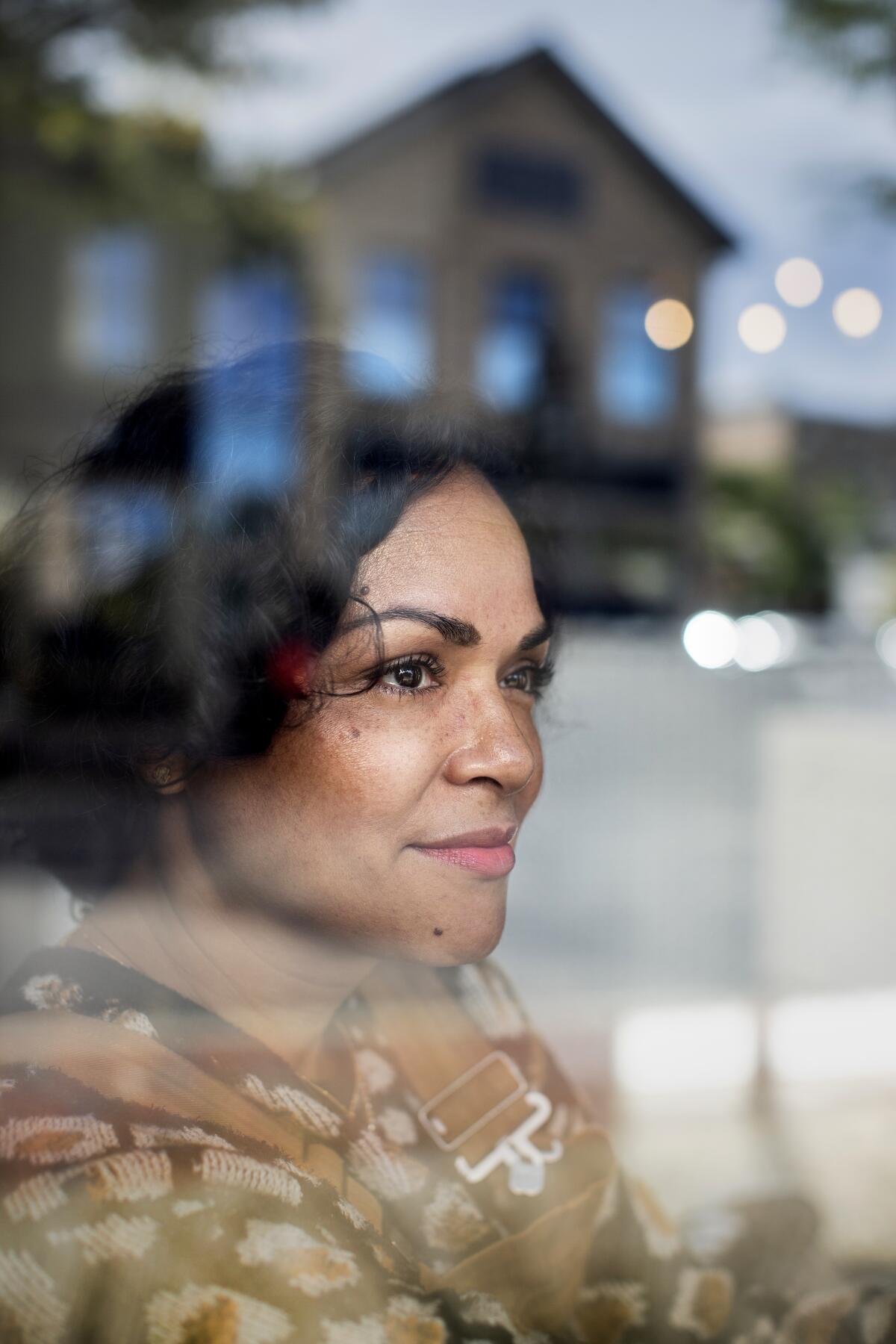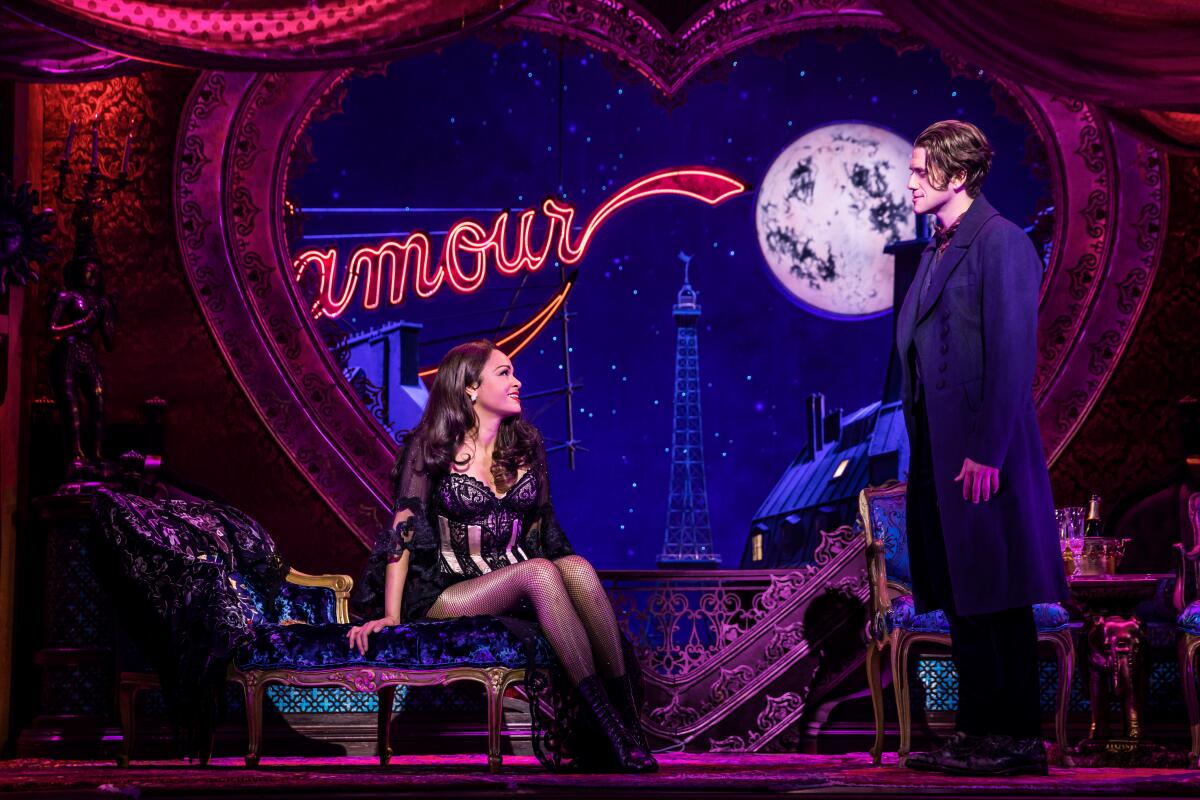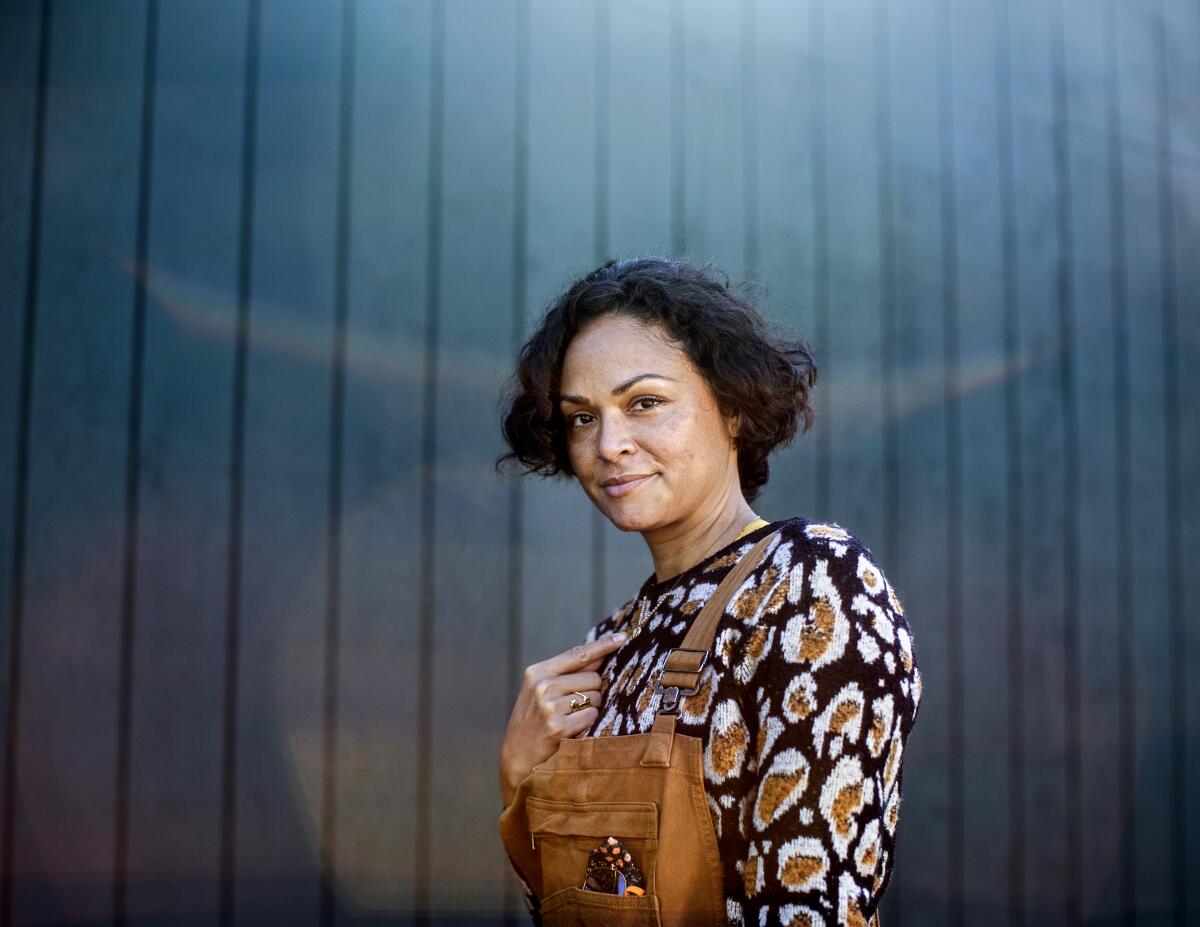âWhy am I making you money?â: Karen Olivo wants something better than Broadway

Broadway may be back, but without Karen Olivo. The alum of âIn the Heightsâ and âWest Side Storyâ announced her exit from the musical adaptation of âMoulin Rouge!â in April as a response to the industryâs relative silence about producer Scott Rudinâs alleged abusive workplace behavior.
Before the Tony Awards, airing Sunday on CBS and Paramount+, Olivo gets candid about her painful Tony-nominated performance in the stage spectacular, leaving a production amid a pandemic and empowering fellow artists and arts workers to get savvier about the inequities of the theater business. The conversation has been lightly edited for clarity and length.
What drew you to the âMoulin Rouge!â role?
I was leaving âHamiltonâ at the time in Chicago because my dream job of a professorship had materialized at Northwestern. But in that process, this audition came up. Itâs one of my favorite movies, and they wanted Satine to have more grit, to be a sex worker and someone who is a fighter. I realized I had never really done a role that uses my entire skill set before, and every single bit of comedic timing, vocal training, dance, every tool I had was going to be utilized in this one role.
It was a challenge to be in my 40s, originating a lead in a musical. I thought, I owe it to myself to see if I can carry a show. I worked with some incredible people, and because there are so many technical components, everyone really has to work together closely to make sure it gets off the ground every night, and itâs gratifying when it does. But it was a real endurance test and, looking back, it was not healthy. I donât know why I was trying to prove that I could do that.
How so?
To fit into some of those costumes, I really did have to become a smaller version of myself. Iâm someone who enjoys eating, and I did not allow myself for so much of the three years it took to make it. Iâm also onstage for most of the show and, because of all the singing and dancing, I have to drink water, which means I have to use the restroom. But they couldnât figure out a time in the show for me to do that. So I spent almost two years, through off-Broadway and then on Broadway, holding my urine, which I now have issues with. At the time, I thought, maybe I just need to tough it out. Now, I can be holding my urine for so long and not know it that when I do know it and itâs time to go, itâs almost too late.
I was also told by a producer not to talk about how difficult the costume changes were. The reality of it is that quick changes are hard â and these are corsets! Have you seen that video footage of Kelli OâHara doing a costume change? They highlighted it because itâs incredible, itâs seconds and itâs done. But that really does speak to the power dynamics and trying to control the narrative at all times, regardless of what the reality of the situation is.
When did the inkling to leave âMoulin Rouge!â begin?
When everything shut down, I had gotten COVID â luckily, it didnât put me in the hospital and I only had two days that were kind of scary. But I went to a building, I did something in good faith, and there was no one checking up on us. Itâs another instance of how the industry doesnât take care of its own, even though weâre âfamily.â It only shows up when the cameras are on or when itâs time to fundraise. In the year of community organizing during the shutdown, I realized I can actually help my industry in a different way, by caring about the people who are suffering in silence, because we canât go back to the way it was.
Then, there was the complete and utter silence from my industry. Iâm a survivor of assault and sexual abuse, and I was like, Iâm not going to say yes to an industry that canât stand up for survivors. These are people from inside our industry, who were courageous enough to speak up! Something really shifted in me.

Plus, when it came time to make offers to go back, they offered the same amount of money, and the same amount of rehearsal time. This is the hardest show Iâve ever done. I was like, whoâs gonna remount it in six weeks? This robot that you built to look like me? I canât. I was like, you donât really mean you want to take care of us. You want to get us to the stage so that you can keep making money or start to make some of the money that you lost. I was like, Iâm good. Iâm out.
Thereâs no malice at all toward the cast or crew, and Natalie Mendoza, who is taking over for Satine, is a gorgeous light of a human being. But the commercial theater system itself is something I canât endorse.
Why make the announcement via Instagram Live?
It was because they wanted to control the narrative yet again. They were like, âCan you just not say anything? And let us control it?â But I was making a personal decision about what this industry means to me and what it canât mean to me anymore. And you want to control it for your pocketbook? No. So I went live.
I recognize that I have the privilege of being able to walk away â Iâm lucky enough to have a partner whose job has been stable, I moved to Madison [Wisconsin] and decided that I can live with a smaller amount of money. A lot of people are not in a place where they can risk everything, flip their life completely upside down and try something else. But itâs also scary when being on a stage is the only thing you know how to do.
Itâs a bold statement. How have you felt about it since?
Doing that drew a line in the sand for me and a lot of people in the industry. I donât want to use the word âlostâ because I realized now I never had some people in my corner, in terms of friends or supporters. But a lot of people canât watch someone do something that theyâre afraid to even admit to themselves. Itâs been isolating because it drives a wedge between me and those who canât have this conversation.
But Iâve found a completely different group of people who will support me in the good times and the bad. My colleagues in grass-roots organizations have been incredible. And my students are wonderful. Theyâve shown me that I have so many more tools than I thought I did, and now Iâm getting to wield them all for anyone who wants it, whether youâre a student at a college where Iâm teaching or someone who gets in my DMs because they want to get something changed in their school board.
You made your Broadway debut in 1996. What do you think sparked your disillusionment with commercial theater?
Iâve always had a tugging that this is not a good relationship. I mean, wonderful things can happen: go to the White House, sing for Obama, win a Tony [for 2009âs âWest Side Storyâ], all of these things that youâre like, âOh my God, is this my life?â
I put it all on pause for a minute before, after I finished negotiating my own contract for the show âMurder Ballad.â Its first incarnation had already taken so much out of me, I was taking home maybe $300 weekly. Then they were like, âWe want to remount it in a bigger place and make more money.â I was like, âCool, but from a business perspective, I need to make sure that Iâm going to make money because it costs me so much to do it.â I got the company members to basically âFriendsâ the negotiations, which doesnât happen in our industry: âThere are only four of us, they canât do it without us, letâs build something that we can be proud of.â
It was in that negotiation where I got to see how I was spoken about by these people who needed what I was going to give them. I started thinking, why am I making you money? Why would I give my art to people whose integrity doesnât match my own?

Will you be attending the Tonys?
I made a choice not to be a part of the Tony Awards. If I thought for a second that Broadway was in a place of real transformation in policy and structure and transference of wealth, and not just putting out statements or changing one tiny little thing or putting a handful of people who look a certain way in positions of power, great. But none of those things have actually happened.
Truthfully, this is a really hard week for me because âMoulin Rouge!â [14 nominations, including best musical] is also opening. My husband said, âYou broke up with your boyfriend, and now heâs dating someone else. And you just you have to kind of watch them and now theyâre engaged, and theyâre gonna get married.â Itâs harder than I thought. Because at my core, it is the medium that I love. Iâm trying to be really graceful with myself this week.
Are you gonna watch the ceremony, at least?
I think Iâm gonna pass on it. What can it do for me? I think itâll just be a source of pain. Iâm sure there are plenty of great performances and especially for people who were just nominated and really want to believe in that, this is gonna be the pinnacle of everything. But I think Iâm going to be nice to myself and let it go and give myself some peace. Thereâs a really good Chinese food place around here. They make some hand-pulled noodles. It might be just a whole spread.
What advice do you have for those who choose to remain in the Broadway system, for whatever reason?
I canât fault them because I donât know their life or their circumstances. I do mourn for them, though. Iâve been in this business for a long time, so I donât want anyone to ever have to go through what I went through. So when I see someone stepping back into a relationship in which theyâre undervalued, where the same BS is happening, it shows me that they donât know how much theyâre worth. It makes me sad when people donât see that it canât happen without them.
I want people to be educated enough so that theyâre making choices based off of what they know rather than what someone told them. Know what youâre getting into. Itâs a business, so act accordingly. You want to get in the ring, know youâre probably going to get hit and itâs not going to feel good. And if you donât want to get hit, then you need to be strategic. We keep believing that Broadway is the center of theater when itâs really a real estate game, because some of the greatest theater never even made it to those stages. Donât go in there being like, all my dreams are gonna come true, and Iâm gonna be a better actor because now Iâm on Broadway. It doesnât happen like that. It needs to be, I need to know more about it if Iâm going to navigate it properly or else Iâm going to get taken for a ride.

For an actor, what does that look like?
What we do is such a strange thing. Youâre baring your soul over and over again at a ridiculous rate. You sign up to be shot out of a cannon every single night. Thereâs a business component that preys on the idea that you have to love this thing to do it. What we forget early on is that weâre groomed to not listen to ourselves, to not discuss money, to not be a problem. So a lot of the work Iâm doing now [with AFECT, a nonprofit founded with Eden Espinosa] has to do with intrinsic value, which is something weâve lost. You canât talk about your worth in dollars and cents if you donât know your worth on another level.
Whatâs fascinating is that the people who make these decisions, who dictate these structures in which we work, are the people who put the money upfront, but they never do the work. I mean, they just happen to have money that they can put into this place. And when the worker is like: âHey, you know what, if you change this, if you let me have that meal there, Iâd be able to work harder, faster, better.â But they still donât listen, they push hard and they donât want to hear about how hard it is because they donât want to feel bad. There are plenty of people who I would gladly work for, but those people treat me like an equal and listen to me when I say, âThis might be too much for me.â
For those who love theater, whether theyâre buying Broadway tickets or even just watching the Tonys, do you hope they do so with a grain of salt?
Look, Iâm not going to tell people to not enjoy live, commercial theater. Thatâs just never going to happen, right? People live and breathe it. But I would hope that they cared about the person who is giving them their all for three hours and was doing things that made your jaw drop, what it takes for them to do that and how theyâre being treated. And sometimes that means you do a little bit more digging. Our audience needs to be a little bit more educated, and thatâs the way we change the market. I mean, we see it all the time: When a company is doing something unethical, people are like, Why are we buying that? I mean, people turned on Goya in two seconds, right? Why would I give you my money?
If weâre gonna be smarter consumers, your job is to figure out where your moneyâs going to go. Because if people were actually honest about the things that happen, then maybe youâd look at a stage and really ask yourself, Is this still entertaining if I know all of the things happening in the background? Am I going to give up my enjoyment so that you can have your humanity? Thatâs a question for the person who buys the ticket. I canât answer that for you. I just know how it falls on me. I know what Iâm going to look for and how Iâm going to spend my money if I go to the theater.
Would you ever go back to it all again â maybe for a specific role?
I canât say that I wonât work in New York or in commercial theater ever again. If I do, youâll know Iâve vetted it properly and Iâm working with people that I trust. If Iâm stepping onstage, itâs going to be for a much bigger picture.
And like, Iâm trying to spend my time figuring out how I can be a better human, rather than how can I sing eight times a week. What role could be better than the one that Iâm creating right now?
More to Read
The biggest entertainment stories
Get our big stories about Hollywood, film, television, music, arts, culture and more right in your inbox as soon as they publish.
You may occasionally receive promotional content from the Los Angeles Times.











